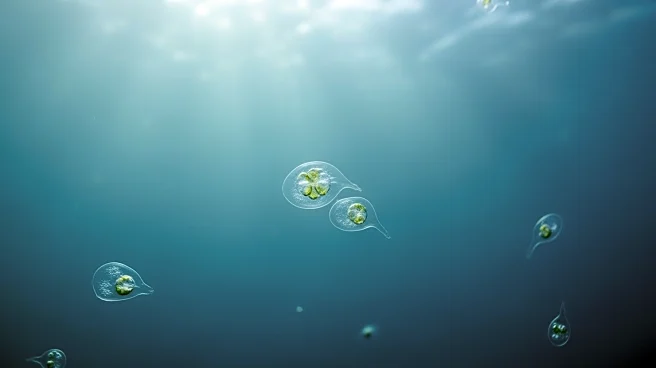What is the story about?
What's Happening?
CytoAgents, Inc., a biotechnology company focused on developing treatments for cytokine release syndrome (CRS) and immune effector cell-associated neurotoxicity syndrome (ICANS), has received a $2.25 million grant from the National Institutes of Health (NIH). This marks the fourth NIH grant awarded to CytoAgents, totaling $7.85 million over five years. The funding will accelerate the development of CTO1681, a drug candidate aimed at preventing CRS and ICANS in patients undergoing CAR T-Cell therapy, particularly those with multiple myeloma. CRS is a significant concern for patients receiving advanced immunotherapies, as it can lead to severe complications. The grant will support the expansion of research into the multiple myeloma patient population, with the goal of moving treatment from inpatient settings to outpatient and community settings.
Why It's Important?
The grant from the NIH underscores the critical need for effective management of CRS and ICANS, which are common side effects of CAR T-Cell therapy. By addressing these toxicities, CytoAgents aims to enhance the accessibility and adoption of CAR T-Cell and T-Cell Engager therapies, which have shown promise in treating various cancers. The development of CTO1681 could potentially transform the treatment landscape for multiple myeloma and other conditions, allowing more patients to benefit from these advanced therapies. The funding also highlights the importance of non-dilutive support for innovative research in the biotechnology sector, fostering advancements in medical treatments that could improve patient outcomes and reduce healthcare costs.
What's Next?
CytoAgents is currently conducting a Phase 1b/2a clinical trial to evaluate the safety and efficacy of CTO1681 in lymphoma patients receiving CAR T-Cell therapy. The new NIH grant will facilitate the expansion of this research into additional patient populations, including those with multiple myeloma. As the company progresses with its clinical trials, it aims to demonstrate the potential of CTO1681 as a universal preventative therapy for CRS and ICANS. Successful outcomes could lead to broader clinical adoption and integration into standard treatment protocols, potentially revolutionizing the management of side effects associated with immunotherapies.
Beyond the Headlines
The development of CTO1681 by CytoAgents not only addresses immediate medical needs but also raises broader questions about the future of immunotherapy and its integration into community healthcare settings. The ability to manage CRS and ICANS effectively could pave the way for more widespread use of CAR T-Cell therapies, which are currently limited by their side effects. This advancement could also stimulate further research into other immune-related conditions, potentially leading to breakthroughs in treating autoimmune diseases and other complex disorders. The ethical implications of expanding access to such therapies, including considerations of cost and healthcare equity, will likely become more prominent as these treatments become more accessible.














